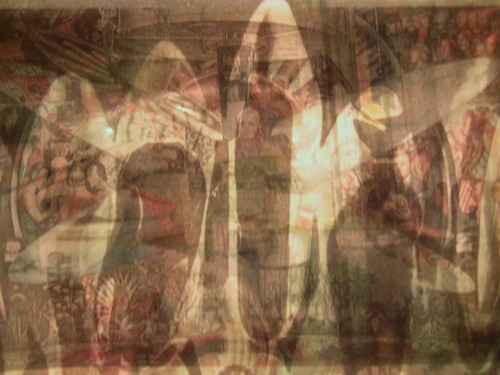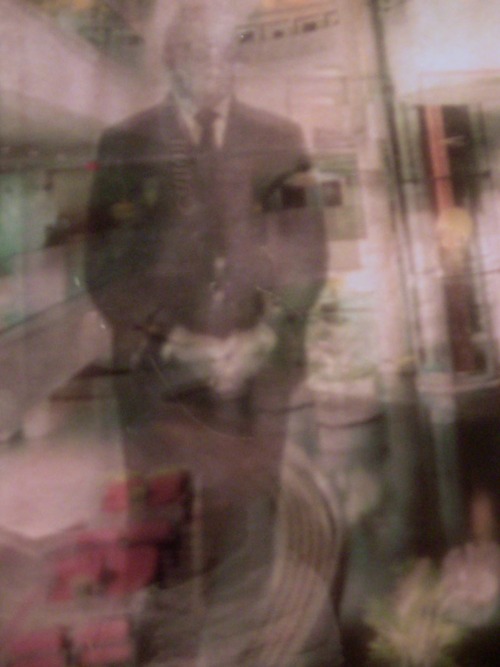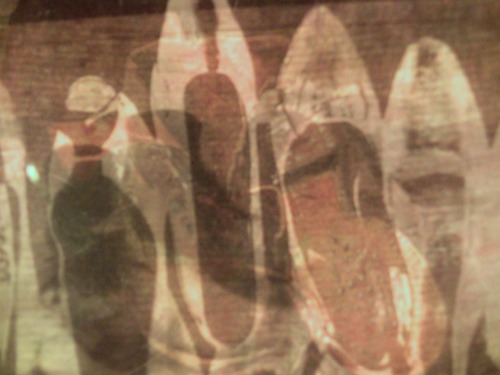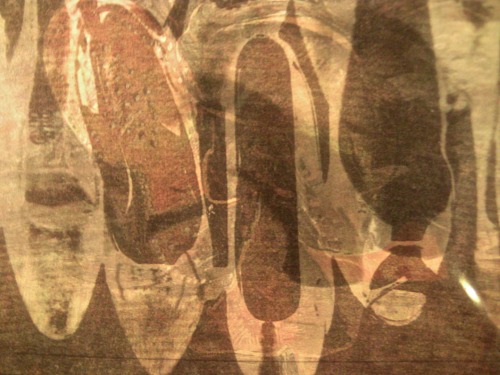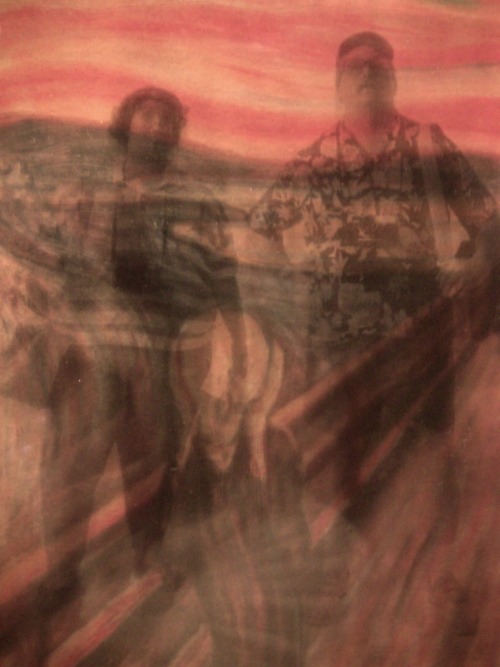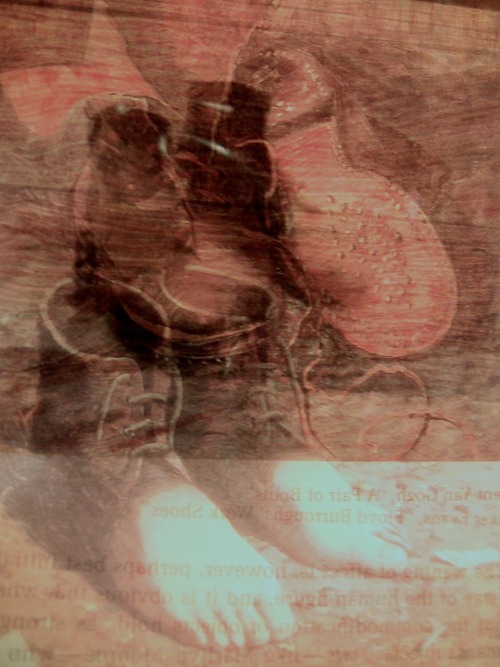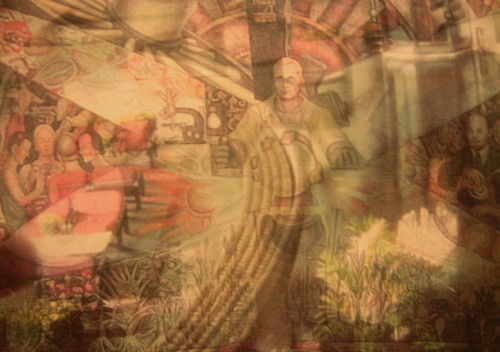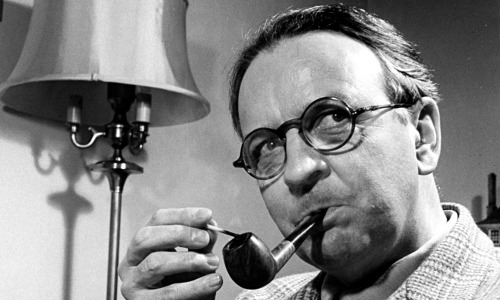#fredric jameson
superimposed pictures from Jameson’s Postmodernism: 1. Man at the Crossroads (Rivera) with Diamond Dust Shoes (Warhol); 2. Museum Guard (Hanson) with Bonaventure Hotel; 3. Diamond Dust Shoes with Man at the Crossroads; 4. Diamond Dust Shoes with A Pair of Boots (Van Gogh); 5. Tourists II (Hanson) with The Scream (Munch); 6. A Pair of Boots with The Red Model (Magritte); 7. Man at the Crossroads with Bonaventure Hotel. Digital photographs of layered transparencies, 2013.
by moi.
Post link
The version of this magnificent, awful essay collected in The Modernist Papers (2007) omits the dedication. I wonder why. In general, I find Jameson both loathsome and impressive, loathsomely impressive, impressively loathsome. How both? Because of the inimitable frisson he creates by casually endorsing not just a civil rights movement but what was in effect a terrorist paramilitary campaign, which he conflates in true Leninist style with the will of “the people”—this in an essay about a quasi-pacifist skeptical of nationalism no less—before calmly assuming his customary perch on the peak of absolute knowledge from which all culture can be surveyed and measured.
Anyway, my main interest in the essay is his assessment of Ulysses’s class character:
Now for a certain conservative thought, and for that heroic fascism of the 1920s for which the so-called ‘masses’ and their standardised city life had become the very symbol of everything degraded about modern life, gossip— Heidegger will call it ‘das Gerede’—is stigmatised as the very language of inauthenticity, of that empty and stereotypical talking pour rien dire to which these ideologues oppose the supremely private and individual speech of the death anxiety or the heroic choice. But Joyce—a radical neither in the left-wing nor the reactionary sense—was at least a populist and a plebeian. ‘I don’t know why the communists don’t like me,’ he complained once, ‘I’ve never written about anything but common people.’ Indeed, from the class perspective, Joyce had no more talent for or interest in the representation of aristocrats than Dickens; and no more experience with working-class people or with peasants than Balzac (Beckett is indeed a far sounder guide to the Irish countryside or rural slum than the essentially urban Joyce). In class terms, then, Joyce’s characters are all resolutely petty-bourgeois: what gives this apparent limitation its representative value and its strength is the colonial situation itself. Whatever his hostility to Irish cultural nationalism, Joyce’s is the epic of the metropolis under imperialism, in which the development of bourgeoisie and proletariat alike is stunted to the benefit of a national petty-bourgeoisie: indeed, precisely these rigid constraints imposed by imperialism on the development of human energies account for the symbolic displacement and flowering of the latter in eloquence, rhetoric and oratorical language of all kinds; symbolic practices not particularly essential either to businessmen or to working classes, but highly prized in precapitalist societies and preserved, as in a time capsule, in Ulysses itself. And this is the moment to rectify our previous account of the city and to observe that if Ulysses is also for us the classical, the supreme representation of something like the Platonic idea of city life, this is also partly due to the fact that Dublin is not exactly the full-blown capitalist metropolis, but like the Paris of Flaubert, still regressive, still distantly akin to the village, still un- or under-developed enough to be representable, thanks to the domination of its foreign masters.
This is clever, very, but then if colonialism plays the role he here attributes to it, what was Dickens’s excuse for also creating petit-bourgeois utopias in the heart of Victorian London (Orwell on Dickens: “the strange, empty dream of the eighteenth- and nineteenth-century middle bourgeoisie…a dream of complete idleness”)? What, for that matter, is the class character of The Waste Land, with its clerks, typists, and (Phoenician) merchants? I mostly got this from my own dissertation advisor, and she mostly got it from Rita Felski, but I want to run with it to the end of the line: modern literature is the paradise of the lower middle class.
Post link
—Justin E. H. Smith, “Is Everything Political?”
While I’m sure a man as erudite and cosmopolitan as Smith understandably doesn’t want to mistaken for a sadly typical example of his American generation—and see my reflections on the Gen-X conservatism here—it’s probably time to drop the “I’m not a conservative” schtick and either make peace with what the left actually believes or make peace with what kind of conservative you actually are. First of all, “But I’m not…!” is a weak defense against an imputation; better to just own the name, wear it with pride. Second, while different thinkers have thought about it in different ways, and we can probably turn up this or that quote from Engels or somebody as a counterexample, still, overall, “[t]here is a stratum of the human that is deeper than politics” is inconsistent with the left’s fundamental commitments: that existence precedes essence, that history is the work of human hands, that what we erroneously call human nature alters in time through social conflict and contestation (this is the dialectic), that humanly-produced economic and social circumstances shape and delimit the human character (this is materialism). Whether you take this “deeper stratum” to be the nature we share with the animals or to be the eternal breath of God, you still think there’s something that social conflict and contestation can’t reach, that humanly-produced economic and social circumstances can’t alter, or that alter these circumstance from outside the human. And if you think art is more profound and moving insofar as it seeks and finds this limit to our conscious agency, rather than “laying bare the device” by which the merely social is naturalized or divinized as this supposed limit, then you are practically the definition of the aesthetic reactionary—probably worse than a fascist, who is at least properly political in his history-making jackboot swagger, as Adorno’s foremost American critical legatee claims:
What Paul DeMan clearly was, however, as the articles testify, can be seen to be a fairly unremarkable specimen of the then conventional high-modernist aesthete, and the apolitical aesthete at that. This is clearly a very different matter from Heidegger (although it seems unquestionable that the twin Heidegger and DeMan “scandals” have been carefully orchestrated to delegitimate Derridean deconstruction). Heidegger may have been “politically naiive,” as they like to say, but he was certainly political, and believed for a time that the Hitlerian seizure of power was a genuine national revolution that would result in a moral and social reconstruction of the nation. As rector of Freiburg University, and in the best reactionary and McCarthyite spirit, he worked at purging the place of its doubtful elements (although one should remember that genuinely radical or leftist “elements” were very scarce in the German university system of the 1920s, compared to the Hollywood of the 1940s or the Federal Republic of the 1970s). His ultimate disappointment with Hitler was shared by a number of people on the revolutionary (anticapitalist) left within National Socialism, who failed for some time to understand Hitler’s pragmatic position as a moderate or centrist or his crucial relationship to big business. I know I will be misunderstood if I add that I have some sneaking admiration for Heidegger’s attempt at political commitment, and find the attempt itself morally and aesthetically preferable to apolitical liberalism (provided its ideals remain unrealized).
—Fredric Jameson, Postmodernism, or, The Cultural Logic of Late Capitalism(1991)
Post link

